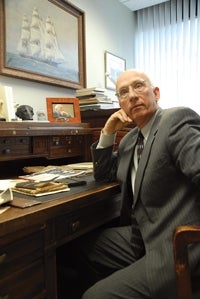All investors in the stock market have learned a powerful lesson over the last six months: What comes up must inevitably go down.
And charitable foundations that invest their endowments in the stock market have felt that pain acutely. And that’s why at least one Central Massachusetts foundation is happy it has diversified its investment portfolio.
The George F. and Sybil H. Fuller Foundation of Worcester has invested $1.2 million in three growing, local biotechnology companies and is considering investment in a fourth.
“In 2008 it was clear all boats sank with the ever-lower tide and that trend has continued in 2009…So we decided to see if there was something else we could do,” said Mark W. Fuller, chairman of the foundation and great-great nephew of George F. Fuller, a former president and chairman of the Worcester-based Wyman-Gordon Co. Wyman- Gordon still operates in Worcester but is owned by Precision Castparts Corp.
In addition to being chairman of his family’s foundation, Fuller is also vice president of Benefit Development Group in Worcester.
The foundation started its new investment strategy about a year ago. The three Worcester-based companies to benefit from the investment are: Biomedical Research Models, ECI Biotech and Grove Instruments. The foundation is choosing to focus on existing businesses located within Worcester or in surrounding communities. The only other criteria, other than a sound business model, is that the company must be in the biotech, health care or medical device industries.
Fuller expects each investment will be returned over a three-to-five year period, through organic growth of the company, through a sale or through going public.
The foundation has focused on biotech, health care and medical device companies because those are the growing industries that exist in Worcester. “There are opportunities here, and investment money right now is extremely hard to come by,” Fuller said, which makes the foundation’s money a mostly welcome investment.
At the end of 2007, the foundation had $69.7 million in assets, and gave out almost $4 million in grants to nonprofits. The foundation’s assets have ranged between $66 million and $70 million since 2004.
“People ask me why I’m doing it and I say why not? We have an investment policy. The primary reason for the investments is to get a return on that investment. We have a profit motive. While doing that we decided, why not see if we can’t stimulate growth in these businesses and grow the number of jobs, which grows the tax base.”
Industry Maverick
Attorney Warner S. Fletcher, a partner in Fletcher, Tilton & Whipple of Worcester, who sits on a number of foundation boards, said he isn’t aware of any other local foundations investing in companies in the community.
A local foundation board that Fletcher served on invested in money in a locally-based venture capital company, Commonwealth Bioventures Inc., which had a series of five investment funds in the late 1980s and early 1990s.
The last and fifth fund ended in 2002. Fletcher said the foundation barely broke even participating in the funds, and so decided not to participate in local investments because the results were disappointing.
“We did not have stellar results from the effort. It brings up a tension between the value and importance of encouraging companies through local investment and the fact that you may get a better return and more sure return-on-investment by investing in other areas that are not local,” Fletcher said.
The venture fund supported startup companies, an area that Fuller said the Fuller Foundation will avoid because of the high risk of failure with that type of company.
One of the lucky three to receive Fuller funds is ECI Biotech Inc., a protein research company that has developed a band aid and a wound dressing that detects the onset of infection almost right away. It received a $949,000 federal grant to commercialize the research and bring the products to market.
“It’s very meaningful in the sense that there’s a new breed of investors out there and Mark Fuller represents that new breed,” said Mitch Sanders, founder and executive vice president of ECI Biotech. “Mark is a really interesting case because it shows the Fuller Foundation is thinking outside the box and is interested in investing in companies that are really going to make a difference in health care.”
ECI is about 12 to 18 months away from launching its products, Sanders said.
Another seed company, Biomedical Research Models, is a contract research organization that provides genetically engineered animals for other biotech and drug companies and conducts its own research.
A researcher at the company, Lejian Yang, has been awarded a three-year, $2.56 million grant to study and develop a vaccination strategy for genital herpes, which has infected 20 percent of the adult population in the U.S.
And the final company, Grove Instruments, formerly Vivascan, has developed a non-invasive glucose testing technology that means those with diabetes would no longer have to prick their fingers to test their blood sugar levels.
When asked if his great-great uncle would have appreciated the foundation’s investments into local companies, Fuller didn’t hesitate with his answer.
“He had an entrepreneurial spirit and although I have no direct evidence that he did, I’m sure he did invest in a few businesses here in Worcester,” Fuller said, adding that his forefathers and foremothers “were all about business. That’s how the foundation came to be.”

